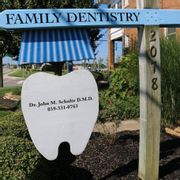
The temporomandibular joint (TMJ) connects the jawbone to the skull on both sides of the face. It functions as a sliding hinge that controls jaw movement. If you experience any aches in the joint and the adjacent muscles, they're likely due to a TMJ disorder. Below, find out more about the causes of jaw pain and how to experience relief.
What Causes Jaw Pain?
Bruxism
Also known as chronic teeth grinding, clenching, or gnashing, this condition can erode or displace discs in the jaw. It also puts pressure on the muscles connected to the TMJ, leading to uncomfortable symptoms.
Injury
A blow or other impact to the face or jaw can throw temporomandibular discs out of alignment or damage the joints. The trauma often develops due to playing contact sports or getting into auto accidents.
Autoimmune Diseases
Autoimmune diseases, including rheumatoid arthritis, lupus, and Sjogren's syndrome, often adversely affect connective tissues, causing them to degenerate. These illnesses can deteriorate the temporomandibular joints, leading to persistent discomfort in the jaw area.
What Are the Symptoms?

In addition to jaw pain, TMJ disorder can cause feelings of tenderness and achiness on one or both sides of the face. Pain and discomfort around the ears are also possible, as well as frequently experiencing difficulty chewing foods.
With TMJ disorder, the temporomandibular joints can lock. This problem can lead to challenges in opening and closing the mouth. It can also produce a clicking noise or grating sensation in the jaw.
How Can You Treat It?
Reducing stress on the temporomandibular joints and muscles can reduce pain and minimize symptoms. To accomplish this, eat soft foods that require less chewing, like yogurt or scrambled eggs. You can also alternate using warm and cold compresses on the sides of the face and do exercises that gently stretch and strengthen the jaw. Chewing gum and biting nails often cause repetitive strain, so avoid these habits. Anti-inflammatory or pain medications can also alleviate symptoms.
For TMJ disorder caused by bruxism, a dentist will create a custom mouthguard. Also known as a nightguard, splint, or orthotic, this device is based on molds and impressions of your teeth. This dental appliance fits comfortably in the mouth and prevents the top and bottom teeth from making contact with one another. As a result, it takes the pressure off the TMJ and promotes relief from jaw pain.
If you experience jaw pain, visit John M. Schulte, DMD, in Covington. For over 40 years, they have provided various dentistry services to residents throughout northern Kentucky, including mouthguards, routine exams, and preventative care. Call (859) 331-0763 to book an appointment, and visit the website to learn more about how they can promote your oral health.
About the Business
Have a question? Ask the experts!
Send your question

